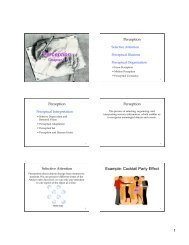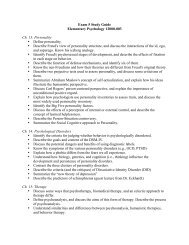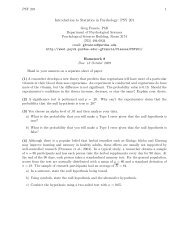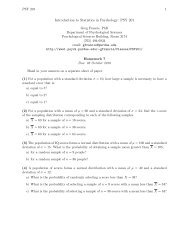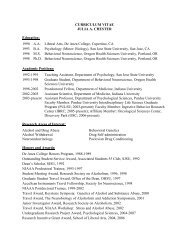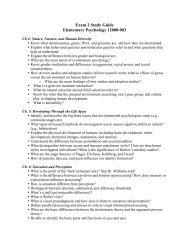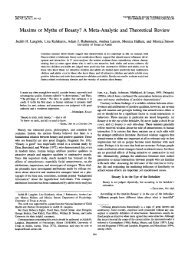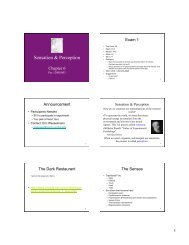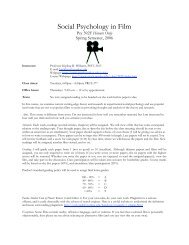Introduction to Cognitive Psychology - Department of Psychological ...
Introduction to Cognitive Psychology - Department of Psychological ...
Introduction to Cognitive Psychology - Department of Psychological ...
Create successful ePaper yourself
Turn your PDF publications into a flip-book with our unique Google optimized e-Paper software.
Pr<strong>of</strong>essor Greg Francis 8/15/12Around 18 monthsChildren learn simple rules <strong>of</strong> syntax All dry. All messy. All wet. I sit. I shut. No bed.All hell breaks looseAfter mastering 2-word strings, <strong>to</strong>ddlers go crazy onlanguageConsider changes in language (year;month) (2;3) Play checkers. Big drum. I got horn. No pee. See baby. See pretty.Content is similar for all languages objects appear, disappear, move,… people do things, see things,… ask questions, who, what, where,... (2;5) Now put boots on. Where wrench go? What that paperclip doing? (2;7) Ursula has a boot on. Shadow has hat like that. (2;9) Where Mommy keep her pocket book? Show yousomething funny. (2;11) Why you mixing baby chocolate? I finishing drinking allup down my throat.Purdue University (3;1) You went <strong>to</strong> Bos<strong>to</strong>n University? Doggies like <strong>to</strong> climb up.Purdue UniversityErrorsThree year olds make lots <strong>of</strong> grammaticalerrors that is because there are lots <strong>of</strong> opportunities forerrors but pick any particular grammatical rule and youfind most three year olds obey it most <strong>of</strong> the time this is amazing because there lots <strong>of</strong> cases that youwould expect would be difficult <strong>to</strong> learnExpected errorsConsider a child hearing adults talk and howthey might incorrectly apply what they learnOut <strong>of</strong> 66,000 sentences, children never madethese errorsHe seems happy. -->Does he seem happy?He is smiling. -->Does he be smiling?He did eat. -->He didnt eat.He did a few things. -->He didnt a few things.Purdue UniversityPurdue UniversityErrorsChildren do make errors, but the errors are consistentwith rules <strong>of</strong> languageChildren <strong>of</strong>ten over generalize a rule -s <strong>to</strong> pluralize a noun» Mouses, leafs -ed <strong>to</strong> make the past tense <strong>of</strong> a verb» My teacher holded the baby rabbits and we patted them.» Hey, Hor<strong>to</strong>n heared a Who.» I finded Renee.» Once upon a time a alliga<strong>to</strong>r was eating a dinosaur and thedinosaur was eating the alliga<strong>to</strong>r and the dinosaur was eatenby the alliga<strong>to</strong>r and the alliga<strong>to</strong>r goed kerplunk.Purdue UniversityOvergeneralizationThese past tense forms sound wrong because Englishhas around 180 irregular verbs inherited from other languages These past-tense forms are not derived from rulesIrregular forms have <strong>to</strong> be memorized, word by wordIf a child cannot remember (in its lexicon) s/he defaults <strong>to</strong> the ruleThese errors are for the most difficult parts <strong>of</strong> alanguage <strong>to</strong> learn Because they dont follow the normal rulesPurdue UniversityPSY 200: Intro. <strong>to</strong> <strong>Cognitive</strong> <strong>Psychology</strong> 3



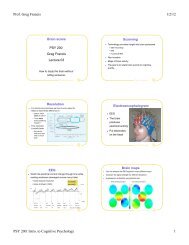

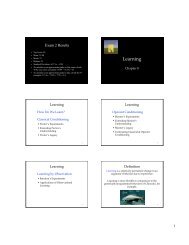
![Exam 4 Study Guide[1]](https://img.yumpu.com/45196739/1/190x245/exam-4-study-guide1.jpg?quality=85)
